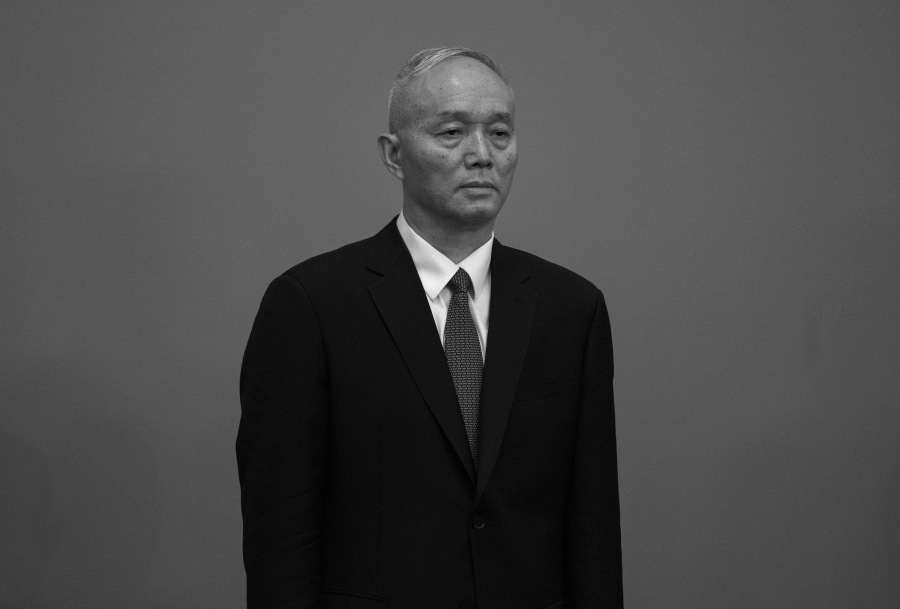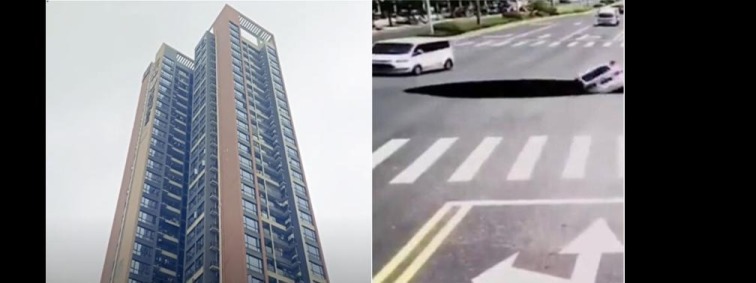File photo: On October 23, 2022, Politburo Standing Committee member Cai Qi attends a press conference at the Great Hall of the People with other newly appointed Standing Committee members and both domestic and international journalists. (Photo by Kevin Frayer/Getty Images)
[People News] The hidden demons did not anticipate that after Yu Menglong's death, an increasing amount of insider information would come to light, involving a broader range of issues. Yu Menglong's spirit has also revealed many secrets through a medium that the public had never imagined, capturing significant attention.
On September 27, Yu Menglong sent a message to 'Whispers from the Fairy Star System,' stating that those arrogant elites (referring to the Chinese Communist Party's elites) have secret dealings that could potentially overturn the entire country and even shock the world with their evil actions. They have become perverse, no longer human, and more terrifying than demons; the beings I encountered in the underworld are not as frightening as they are. The cycle of cause and effect is indeed at work; they will ultimately be crushed like ants, overwhelmed by their own wickedness, and will face the consequences of their actions.
Recently, artist Wen Yifan, who had previously supported Yu Menglong, remarked, 'The umbrella above has broken.' On November 15, the Chinese Communist Party officially announced that Beijing's Deputy Public Security Director Dong Yijun and Xinjiang Production and Construction Corps Discipline Inspection Secretary Jiang Xinjun both passed away due to 'sudden illness during work.'
In response, internet celebrity Li Mu Yang noted that Dong Yijun was a close associate of Minister of Public Security Wang Xiaohong, and his sudden death at this time is 'too timely,' raising suspicions that it may be connected to the Yu Menglong case.
Following this, Xi Jinping's two key aides, Cai Qi, who oversees propaganda, and Wang Xiaohong, who manages the public security system, have recently been frequently absent from significant events.
Commentator Jiang Feng noted that within the opaque political landscape of the Chinese Communist Party (CCP), there exists a concept known as absent political science. This concept suggests that when a high-ranking official unexpectedly fails to attend a significant event, it indicates that they are in serious trouble. For instance, Foreign Minister Qin Gang was initially reported by the CCP's Ministry of Foreign Affairs to be ill, but after disappearing for over a month, he was dismissed, effectively vanishing from the political arena. In August 2023, Defence Minister Li Shangfu missed an important military meeting, and by June 2024, he was expelled from the party on multiple charges, likely facing a lifetime in prison. Similarly, He Weidong, Vice Chairman of the Central Military Commission, was absent from a Politburo meeting in April this year, and by October, it was officially announced that he had been expelled from the party and referred to judicial authorities. A common thread among these individuals is that they first go missing, followed by a crisis, with the time frame typically being short—ranging from a few weeks to a few months—but the outcome is invariably disastrous. It is as if there is an invisible gallows in Zhongnanhai; once these officials are absent, their necks are already in the noose, merely awaiting the moment when the support beneath them gives way.
Jiang Feng pointed out that Cai Qi, a member of the Politburo Standing Committee and Director of the General Office, serves as Xi Jinping's chief aide. On November 9, during the opening ceremony of the Guangzhou National Games, Cai Qi was notably absent. On November 12, when Xi Jinping met with the King of Spain, Cai Qi was still missing. Again, on November 14, when Xi Jinping met with the King of Thailand, Cai Qi was nowhere to be found.
Wang Xiaohong serves as the Secretary of the Central Secretariat, Minister of Public Security, and Deputy Secretary of the Central Political and Legal Affairs Commission, acting as Xi Jinping's right-hand man. He was absent once in September and disappeared for over a month. Although he reemerged in October, his power has been significantly diminished. After attending the Guangzhou National Games on November 9, he has not made any public appearances since, marking a full seven days of absence by November 16.
Dong Yijun, who was part of Wang Xiaohong's public security system, raises questions about the circumstances of his death. How is it classified? What honours will be posthumously awarded? The decision does not rest with Wang Xiaohong but rather with the Political and Legal Affairs Commission led by Chen Wenqing. This indicates that Wang Xiaohong has lost even the authority to manage the affairs of his own secretary, highlighting the extent to which his power has been eroded.
Jiang Feng speculates that Wang Xiaohong may have been summoned for a 'tea' meeting, a euphemism for being called in for questioning.
Tang Jingyuan, a political commentator based in the United States, informed The Epoch Times that Dong Yijun was responsible for traffic management in Beijing. It is possible that he fell ill due to the heavy security responsibilities during the Fourth Plenary Session. Given the sensitive nature of this period marked by high-level power struggles, Dong Yijun's sudden death could raise suspicions of a connection to these conflicts, which is why the authorities are keeping the details under wraps. However, the information could have been disclosed after the Fourth Plenary Session, and the 25-day delay in announcing it raises further suspicion.
During his time as the head of the Tongzhou Branch of the Beijing Public Security Bureau, Dong Yijun was targeted by international organisations investigating the persecution of Falun Gong practitioners due to his involvement in such actions.
Current affairs commentator Li Yanming remarked that Dong Yijun's unexpected death, whether resulting from internal conflicts within the CCP or from illness, serves as a warning to CCP officials, particularly those in public security, that once they engage in wrongdoing, retribution can strike at any moment.
Current affairs commentator Li Linyi previously noted that the unusual deaths of officials within the Chinese Communist Party (CCP) are often suspected to be linked to corruption investigations. However, these deaths may also result from sudden illnesses or internal power struggles, especially since Jiang Xinjun, who oversees anti-corruption efforts, could easily become a target for rivals.
Australian anti-communist influencer Jiang Wangzheng informed The Epoch Times that he received reports from within China suggesting that Jiang Xinjun was poisoned. The specific causes of such unusual deaths within the CCP are frequently kept under wraps, as many party members fear the potential fallout from such disclosures. For example, there have been recent reports of high-ranking officials in Shaanxi falling to their deaths, yet this has not been covered by state media.
Yuan Hongbing, a legal scholar residing in Australia, told The Epoch Times that the CCP is currently undergoing a harsh purge, and the party is reluctant to disclose the abnormal deaths of many officials, fearing that such revelations could have a shocking impact and undermine the party's unity and morale. △











News magazine bootstrap themes!
I like this themes, fast loading and look profesional
Thank you Carlos!
You're welcome!
Please support me with give positive rating!
Yes Sure!